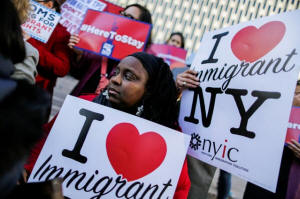|
Haitians in U.S. malign Trump decision to
send them back home
 Send a link to a friend
Send a link to a friend
 [November 22, 2017]
By Daniel Trotta [November 22, 2017]
By Daniel Trotta
NEW YORK (Reuters) - Haitian immigrants on
Tuesday decried a U.S. decision to end a program that granted 59,000
Haitians temporary visas after the 2010 earthquake, saying they would be
sent back to a country that has yet to recover from that disaster and
others since.
The United States offered Temporary Protected Status, or TPS, to
Haitians after the January 2010 earthquake killed some 300,000 people
and devastated a country that has long been the poorest in the Americas.
The administration of former President Barack Obama extended the program
several times, finding that conditions in Haiti were too dire to send
the beneficiaries home. President Donald Trump's administration, after
previously granting a six-month extension, announced on Monday that it
would end TPS for Haiti in July 2019.

Any Haitian who cannot obtain another kind of U.S. visa will be subject
to deportation back to the Caribbean nation, where some earthquake
victims are still homeless and the country is wobbling from Hurricane
Matthew, a cholera outbreak and political instability.
"We're just left in a void," said Sebastian Joseph, 26, a Haitian
immigrant living in the Flatbush section of Brooklyn where Haitians and
other Caribbeans are concentrated.
He said virtually all Haitians want to stay in the United States, where
they have carved out a niche in construction and healthcare services
such as caring for the elderly and sick.
"America has been the home of the free for 200 years or more. Everybody
wants to come to America," Joseph said. "A lot of people will go back to
nothing."
Trump's supporters note that the visa program was always meant to be
temporary and that Trump ran a 2016 presidential campaign promising
restrictive immigration policies.
At least one Haitian TPS recipient in Brooklyn accepted that eventually
she must return.
"If they say I have 18 months and that's it, I say thank God, and then I
will go," said Margaret Etienne, who gave birth to a 3-year-old son here
who is now a U.S. citizen.
"It's my country. I love my country," she said after buying takeout from
a Haitian restaurant with her son on a stretch of Church Avenue that is
also called Bob Marley Boulevard, after the late Jamaican musician.
In ending the TPS designation, acting Secretary of Homeland Security
Elaine Duke said she had determined that the "extraordinary but
temporary conditions caused by the 2010 earthquake no longer exist."
Some critics dispute that Haiti has recovered and question how Duke
reached such a conclusion.
[to top of second column] |

Haitian immigrants and supporters rally to reject DHS Decision to
terminate TPS for Haitians, at the Manhattan borough in New York,
U.S., November 21, 2017. REUTERS/Eduardo Munoz

Senator Marco Rubio, a Republican from Florida, the state with the
most Haitians, urged Trump to extend TPS, warning in a column he
wrote for the Miami Herald that "Haitians sent home will face dire
conditions, including lack of housing, inadequate health services
and low prospects for employment."
Fifty-nine percent of Haiti's population lives below the poverty
line of $2.41 per day, according to the World Bank.
"It's not going to be good for me. I don't know what I would do,"
said Ives Joseph Laforgue, 63, an unemployed Haitian immigrant in
Flatbush who said he had open-heart surgery in 2014 and lives off
the charity of Brooklyn's Haitian community. Still, he said he would
have even less in Haiti.
Haitian community leaders and pro-immigration politicians in New
York on Tuesday pledged to pressure the Trump administration to
extend TPS.
Among them was U.S. Representative Nydia Velazquez, a Democrat who
introduced legislation that would protect from deportation
immigrants who have TPS and Deferred Enforced Departure (DED),
another program subject to presidential discretion that was extended
by Obama but is due to expire in March 2018.

Ricot Dupuy, station manager of Radio Soleil, a Haitian-themed
broadcaster in New York, said he thinks the decision is racially
motivated.
"This pressure to send immigrants back home ... The idea is to
whiten America," Dupuy said from his Brooklyn studio.
"The U.S. Chamber of Commerce is not stupid. They know that TPS
holders, it's good for this country. The business community knows
it's good for them. And eventually they may have the last word."
(Reporting by Daniel Trotta Additional reporting by Peter Szekely;
Editing by Toni Reinhold)
[© 2017 Thomson Reuters. All rights
reserved.]
Copyright 2017 Reuters. All rights reserved. This material may not be published,
broadcast, rewritten or redistributed. |